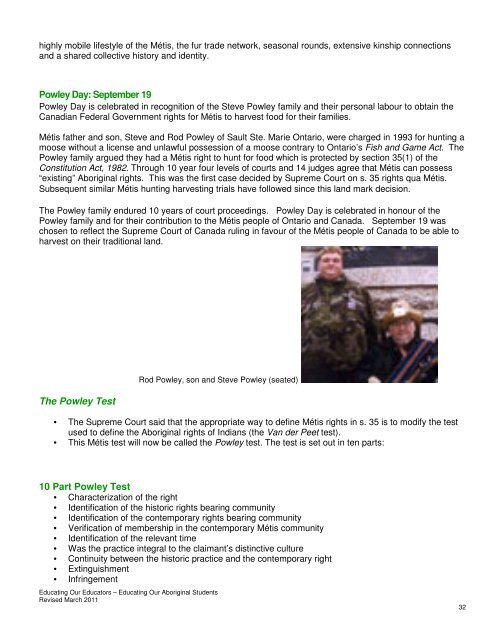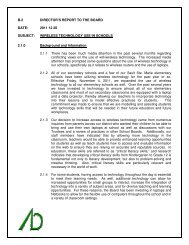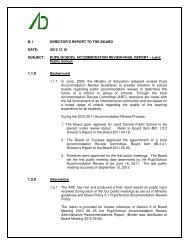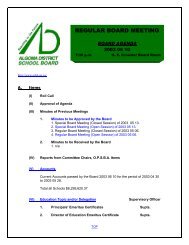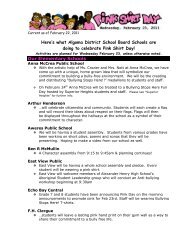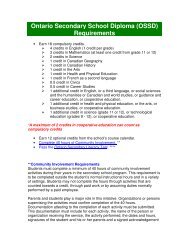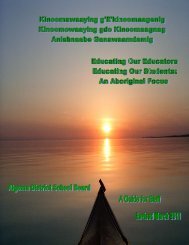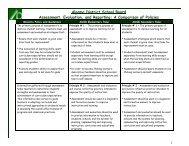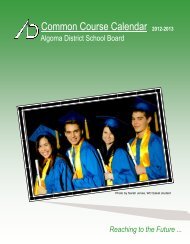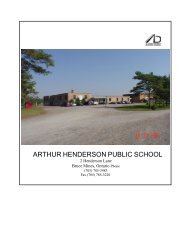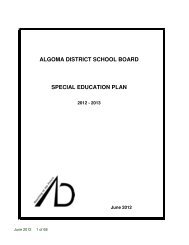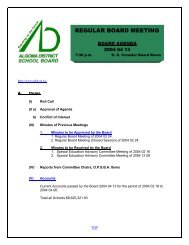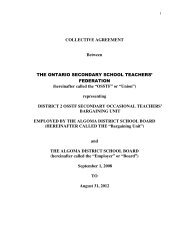Educating Our Educators (March 2011) - Algoma District School Board
Educating Our Educators (March 2011) - Algoma District School Board
Educating Our Educators (March 2011) - Algoma District School Board
- No tags were found...
Create successful ePaper yourself
Turn your PDF publications into a flip-book with our unique Google optimized e-Paper software.
highly mobile lifestyle of the Métis, the fur trade network, seasonal rounds, extensive kinship connectionsand a shared collective history and identity.Powley Day: September 19Powley Day is celebrated in recognition of the Steve Powley family and their personal labour to obtain theCanadian Federal Government rights for Métis to harvest food for their families.Métis father and son, Steve and Rod Powley of Sault Ste. Marie Ontario, were charged in 1993 for hunting amoose without a license and unlawful possession of a moose contrary to Ontario’s Fish and Game Act. ThePowley family argued they had a Métis right to hunt for food which is protected by section 35(1) of theConstitution Act, 1982. Through 10 year four levels of courts and 14 judges agree that Métis can possess“existing” Aboriginal rights. This was the first case decided by Supreme Court on s. 35 rights qua Métis.Subsequent similar Métis hunting harvesting trials have followed since this land mark decision.The Powley family endured 10 years of court proceedings. Powley Day is celebrated in honour of thePowley family and for their contribution to the Métis people of Ontario and Canada. September 19 waschosen to reflect the Supreme Court of Canada ruling in favour of the Métis people of Canada to be able toharvest on their traditional land.The Powley TestRod Powley, son and Steve Powley (seated)• The Supreme Court said that the appropriate way to define Métis rights in s. 35 is to modify the testused to define the Aboriginal rights of Indians (the Van der Peet test).• This Métis test will now be called the Powley test. The test is set out in ten parts:10 Part Powley Test• Characterization of the right• Identification of the historic rights bearing community• Identification of the contemporary rights bearing community• Verification of membership in the contemporary Métis community• Identification of the relevant time• Was the practice integral to the claimant’s distinctive culture• Continuity between the historic practice and the contemporary right• Extinguishment• Infringement<strong>Educating</strong> <strong>Our</strong> <strong>Educators</strong> – <strong>Educating</strong> <strong>Our</strong> Aboriginal StudentsRevised <strong>March</strong> <strong>2011</strong>32


